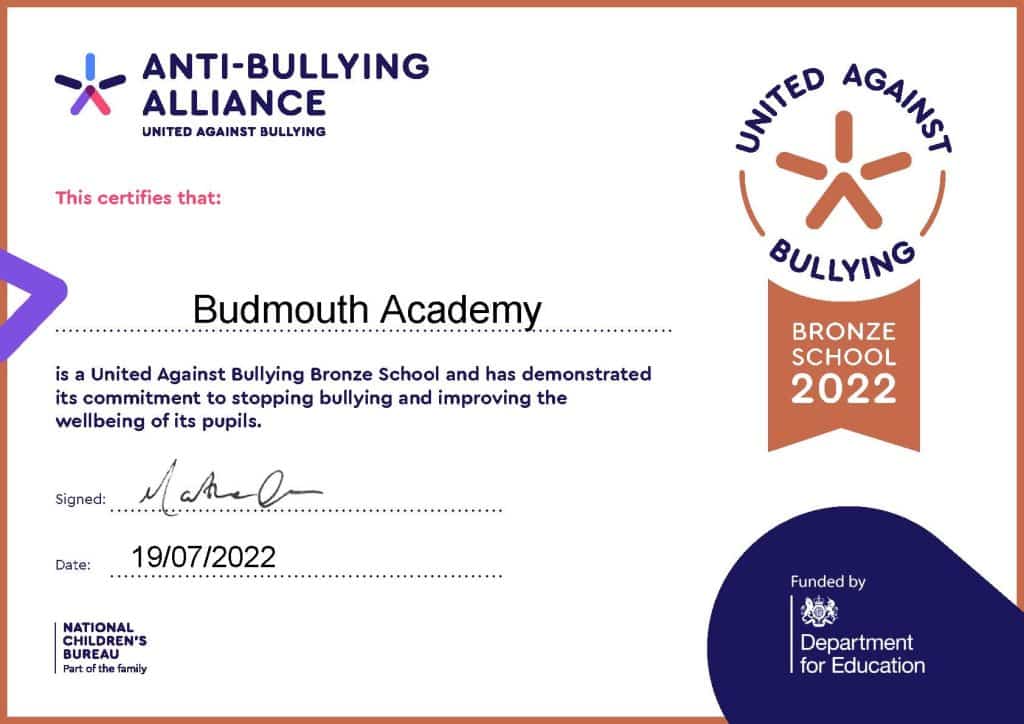The Designated Safeguarding Lead (DSL) at Budmouth Academy is Sally Emms. The DSL has a responsibility for child protection and the welfare and wellbeing of young people. If you have any worries or concerns about any of our students please contact the DSL or the Deputy DSL’s (HoS & PSL), on 01305 830500 or semms@budmouth-aspirations.org .
Budmouth Academy recognises that the welfare of the child is paramount and takes seriously its responsibility to safeguard and promote the welfare of the young people in its care. the Board of Directors, staff and volunteers at Budmouth Academy understand the importance of working in partnership with children, their parents/carers and other agencies in order to promote children’s welfare.
For more information about Safeguarding at Budmouth Academy, please use the links to access our policies and procedures, information about our Designated Safeguarding Staff and Outside Agency Support.
Dorset Safeguarding Children Board This link takes you to a website for parents and pupils which informs you about schools’ responsibilities in relation to child protection.
Anonymous Reporting
At Budmouth Academy we believe that safeguarding our students is of the utmost importance and that the ability to report concerns to an appropriate adult is vital in ensuring everyone remains safe. Evidence from nationwide studies and recent media reporting suggests that sexual harrassment and online bullying is under-reported. At Budmouth we are determined to do something about this. We have therefore decided to introduce a new system that will encourage students to report concerns anonymously so that we can support them at school.
‘Whisper’ is an on-line and open reporting route that can address concerns and issues that affect the mental-health, safety and well-being of children, young people and staff.
This can be accessed by clicking on the link below. This will also be displayed on the school website (https://swgfl.org.uk/whisper/baw1/) Alternatively students can text BAW1 followed by their message to 07860 021323.
There is then the choice whether to supply contact details, or to share these concerns anonymously. The personal details are not shared or stored as part of the process, unless someone chooses to include them – this also includes the mobile phone number, if reporting issues by SMS.
What can be reported?
Sharing things that upset someone is not always an easy thing to do. Whisper is designed to act as another way that students can tell a responsible adult at school about any issues that they might be having. Sometimes that way might be easier than a face to face meeting.
This might include:
- Someone being bullied (the reporter or someone else).
- Something happening online that they don’t feel comfortable with and might need some advice on.
- If somebody at the school is at risk.
- If somebody has a problem like harassment or prejudice they wish to discuss.
What will happen after a concern is reported?
We will endeavour to read any concerns raised within 24 hours.The school has a duty of care to deal with any issues that involve the safety or well-being of students or pupils, so you can expect this to be acted upon. The school will then investigate the issue further using the information you have provided.
Not all issues that are reported can be resolved. But reporting can raise awareness for school staff and ensure that everyone’s voice is able to be heard.Your child will receive information regarding Whisper in school assemblies next week, and the system is already live.
Online Safety
Online Safety is an ever growing and changing area of interest and concern. The internet and related technologies, including mobile devices such as phones, gaming media, tablets, and watches, are developing rapidly and are integral to the daily lives of our students.
Many of these technologies are used to enable students to engage creatively with their learning. Socially, our students often use the internet for entertainment, interaction and communication with ‘friends’ – bringing about new risks which many adults were never faced with. It has never been more important for parents and carers to understand how their children use the internet and associated technologies, so that they can help to manage the risks that exist and reinforce the important online safety messages that we should all be promoting.
You can also find out more about how children use social media, the apps they use, the risks they face, how to use privacy settings, and advice and tips about how to talk to your children, at:
- www.childnet.com/sns
- www.internetmatters.org
- www.nspcc.org.uk/onlinesafety
- www.parentzone.org.uk
- www.askaboutgames.com
Where can I go to get support to help keep my child safe online?
There is a lot of support available to keep your child safe online.
Below are some useful links to help parents and carers:
- Sports, clubs and other activities | NSPCC (NSPCC)
- Thinkuknow (advice from the National Crime Agency to stay safe online)
- Internet matters (support for parents and carers to keep their children safe online)
- Parent info (support for parents and carers to keep their children safe online)
- LGfL (support for parents and carers to keep their children safe online)
- Net-aware (support for parents and carers from the NSPCC)
- Childnet offers a toolkit to support parents and carers of children of any age to start discussions about their online life, to set boundaries around online behaviour and technology use, and to find out where to get more help and support
- Let’s Talk About It has advice for parents and carers to keep children safe from online radicalisation
- UK Safer Internet Centre has tips, advice, guides and other resources to help keep children safe online, including parental controls offered by home internet providers and safety tools on social networks and other online services
- SafetyDetectives – Parents’ Guide for Safe YouTube and Internet Streaming for Kids.
Downloads
Online Safety
View a series of quick guides to social media apps.
Relevant Policies



